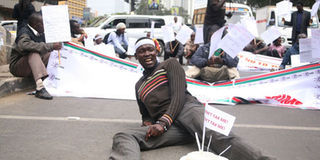Kenyans forced to make hard choices as VAT law hits

PHOTO | PHOEBE OKALL A civil society member demonstrating against the VAT Bill on July 2, 2013. The impact of the new Value Added Tax (VAT) Act was directly felt when milk prices skyrocketed to Sh55 for half a litre from Sh45 overnight in some outlets.
What you need to know:
- Matters got worse for Nairobi residents mid-week when the county government revised most of its charges upwards, including in hospitals, mortuaries, business licences and parking fees.
- Mr Francis Kituku, proprietor of Fran Dishes on Tom Mboya Street, said some of his suppliers had brought items with new prices, even though he knew they were not affected.Cofek secretary General Stephen Mutoro says Kenya will witness an upsurge in counterfeits and bad quality products, which will deny the government revenue. This, he says, will negate the very objective the law aims to attain.
It started last Sunday with a brief announcement by the national revenue collection agency that a a new tax would come into force the following day.
Within minutes of the Kenya Revenue Authority (KRA) announcement, retail shops across the country raised prices of virtually all commodities upwards. Goods were also delivered to retailers bearing higher prices.
The impact of the new Value Added Tax (VAT) Act was directly felt when milk prices skyrocketed to Sh55 for half a litre from Sh45 overnight in some outlets. As expected, this sparked an outcry from Kenyans who were already bogged down by a high cost of living.
Matters got worse for Nairobi residents mid-week when the county government revised most of its charges upwards, including in hospitals, mortuaries, business licences and parking fees.
On the national scale, the VAT law has forced Kenyans to scale back on expenditures or seek alternative means.
Ms Sophia Ndanu, a mother of two living in Nairobi, said she has been forced to reduce the number of milk packets to two from four she was using daily.
“I used to give my children two packets of milk while my husband, the house help and I consume two,” says Ms Ndanu. “Now, it’s time to make tough choices.”
For Ms Grace Muthoni, a resident of Kawangware, milk vendors have come in handy. “I am buying a litre at Sh70 whereas the same amount is going for Sh110 in supermarkets,” she said. But an ongoing crackdown targeting raw milk vendors may affect her suppliers.
Besides milk, Kenyans are now digging deeper into their pockets to buy kerosene, cooking gas, charcoal and pay electricity bills.
Consumers will also pay a Water Resource Management Authority levy of five cents per kilowatt hour. But this measure awaits the determination of a court case filed by the Consumers Federation of Kenya (Cofek).
Even though items such as rice, bread, infant formula, and bread have theoretically been spared, Kenyans have been fleeced by profiteering traders who increased the prices of commodities and services across the board — including those to which the 16 per cent VAT had already been added.
Some traders feared that the KRA might later demand tax arrears because of the confusion, hence the “proactive measure”.
Mr Francis Kituku, proprietor of Fran Dishes on Tom Mboya Street, said some of his suppliers had brought items with new prices, even though he knew they were not affected.
“I absorbed some costs, but others I passed on to the customers,” he said. “I know they are unjustified but I blame KRA for leaving the taxpayers exposed for a full week.”
Reached for comment on Friday, KRA communications chief Kennedy Onyonyi said a complete list of the affected goods and services will soon be made public.
“People have been calling to ask, and rightfully so, for a list of the affected items,” Mr Onyonyi told Sunday Nation on Friday morning. “We are finalising it, and it will be on our website in an hour.” By the time of going to press, almost 48 hours later, the list had not been uploaded.
But Mr Nikhil Hira, a tax expert at Deloitte & Touche Kenya, said this is simple. “The taxable items are arrived at by default, that is, because they are not in the first and second schedule of the Act.”
Experts are now warning that the Act will have an impact beyond an increase in the price of household goods.
Mr Kwame Owino, chief executive officer of the Institute of Economic Affairs, says due to Kenya’s high degree of inequality in both income and total wealth, the law will disproportionately affect the poor.
“The National Assembly ought to have been alert to the regressive nature of a consumption tax in general and acknowledged that the widening of the tax base should be accompanied by a reduction in the rate of VAT,” he wrote in the Saturday Nation.
Cofek secretary General Stephen Mutoro says Kenya will witness an upsurge in counterfeits and bad quality products, which will deny the government revenue. This, he says, will negate the very objective the law aims to attain.
“It will also fuel inflation and deflate foreign direct investment, force consumers to hold back spending resulting in a depressed economy and high crime rates,” he says.
Mr John Thindi, a tax director at PKF Kenya, argues that tourism, which Kenya has been trying to nurture, will also become expensive making Kenya unattractive.
KRA has started levying a 16 per cent VAT on park and conservancy fees. This week, Serena Hotels said it has reviewed its air and ground packages prices as well as game drives prices with effect from September 2. Other industry players are set to take the cue.





